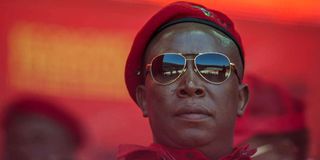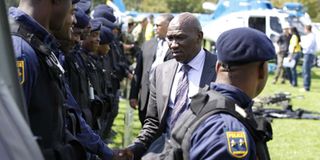Premium
White farmers, Malema’s EFF square off over South Africa’s farm murders

Economic Freedom Fighters (EFF) leader Julius Malema.
What you need to know:
- With tensions rising rapidly and both sides squaring off what seems like an inevitable showdown, an outright confrontation looms with race being the ostensible dividing line.
- Mr Malema urged his followers to “attack” in defence of “our democracy and property”, saying President Cyril Ramaphosa was “scared to respond decisively”.
- South African farming bodies have been complaining since the mid-1990s of high levels of violence being perpetrated, sometimes by organised gangs, on farmers living in remote areas, far from neighbours.
The simmering issue of attacks on South African farmers – mainly white Afrikaners – has come to the boil over the latest and, particularly gruesome, farm killing.
A showdown between furious, well-armed farmers and Julius Malema’s Economic Freedom Fighters (EFF) is increasingly likely as the situation threatens to get out of control.
That attack saw 21-year-old farm manager Brendin Horner beaten to death and strung up to a pole on a farm in the eastern Free State province, an area plagued by stock theft and farm attacks, including arson and destruction.
That resulted in a large gathering of angry farmers in the small farming town of Senekal when the alleged perpetrators were to appear in court.
Gathered outside the Senekal Magistrate’s Court, scores of outraged farmers demanded that the police hand over the two suspects – aged 34 and 43 – to them. That did not happen.
Protesters then stormed the court building, damaging public property and trying to overturn police vehicles, one of which was toppled and set alight.
Once inside the court, they overturned furniture and threw files around. At least three gunshots were heard. The protest took place in full view of the police and was widely broadcast in South Africa, drawing fierce criticism not only from the police minister, but also political groupings, including Malema’s EFF and the ruling African National Congress’ Youth League.
Rising tension
With tensions rising rapidly and both sides squaring off what seems like an inevitable showdown, an outright confrontation looms with race being the ostensible dividing line – even though, in reality, black farmers in some areas are having as bad a time of things as are their white counterparts.
South African farming bodies have been complaining since the mid-1990s of high levels of violence being perpetrated, sometimes by organised gangs, on farmers living in remote areas, far from neighbours.
With insufficient policing in rural areas, authorities have been slow to react and often the perpetrators have escaped.

Farmers kneel as they hold white crosses during a protest and prayer day against farm and smallholding attacks and murders, at the Union Buildings in Pretoria on October 10, 2020.
As a consequence, farmers in various regions have formed what amount to rapid-response units, which have proved successful in catching some attackers but are deeply troublesome to the government, which takes a dim view both of vigilantism and of a body of organised and armed white Afrikaner farmers acting as a paramilitary force.
For their part, the farmers say they are merely engaged in mutual self-defence and that the state cannot do what they are doing for themselves.
Those distinctions aside, the issue has grown into something much larger.
The ongoing attacks on farmers have drawn so much attention that US President Donald Trump said SA’s white farmers should be granted US citizenship and allowed to resettle there.
But most of the angry farmers, while worried about a future in which they may be pitted not against local communities or their workers but “outside elements with political agendas”, say they are not going anywhere and have vowed to fight for what they see as their land.
Emotive debate
This, in turn, has triggered highly emotive political responses from those who see current white agricultural land ownership as a continuation of colonial and apartheid era white oppression and privilege.
Attacks on these farmers, plus the increasing problem of stock-theft – made all the more problematic because of SA’s porous borders, especially with Lesotho which flanks the Free State province, current focus of the issue – have also included extreme violence, mutilations and rape as well as arson and equipment sabotage, resulting in some rural areas having ‘siege-like’ atmosphere.
The highly charged and extremely volatile situation, being described as ‘a powder-keg waiting for a spark’, has the authorities worried to the point that Police Minister Bheki Cele has attempted to calm over-heated tempers with a visit to the area and a meeting with the farmers.

South African Police Minister Bheki Cele.
But it is doubtful that Cele’s visit will be sufficient to settle the mainly white farmers who have been heavily affected by the criminality which has come to plague them. It is also not helpful, as far as the farmers are concerned, that Cele has been singularly unsupportive, criticising self-defence units while promising better policing that has not happened. It has helped that two alleged perpetrators of the latest killing were caught.
But the depth of anger seething in the farming community was apparent by the unrest and confrontational attitude of the farmers who wanted the accused, presumably to deliver summary ‘justice’ – exactly what the authorities are afraid of.
Some farmers have got to the point that they are no longer are prepared to listen to what Cele or others in political leadership have to say – they are determined to “protect our own”, even if that means a full-blown racial confrontation, saying “we’ll give them given war, if they wanted it”.
Reacting to the white farmers’ protests, the ANC Youth League (ANCYL) accused the farmers of using crime as “an excuse” to undermine the democratically elected government. Free State ANCYL activist Sizophila Mkhize was quoted as saying that “damaging government property is crime and that is not a way to solve … crime or show anger”.
While not condoning the latest murder, “we are saying that cannot be an excuse for white people to do what they did,” Mkhize said, clearly illustrating the embedded racial dimensions of the problem. “If they want war, we are going to give them war. They killed our people and we have not forgotten. They killed … Chris Hani – a lot of our people. It’s just that we chose peace over violence,” Mkhize told reporters, while denying that she was inciting violence. The farmers’ protest had “shown us that white people are still at war ... we have to teach them a lesson,” said another ANC Youth League activist.
In a separate protest, white farmers marched to the Union Buildings, seat of the government in Pretoria, under the banner “Unite Against Farm Murders”. The farmers claim they are under threat, though latest official crime figures show that farm murders accounted for just 48 of the 21,325 murder cases in the 2019/20 financial year.
Mr Malema urged his followers to “attack” in defence of “our democracy and property”, saying President Cyril Ramaphosa was “scared to respond decisively”.
The official opposition Democratic Alliance has referred Malema and EFF MP Nazier Paulsen to Parliament’s ethics committee over their recent social media posts which, the party said, appeared to “incite violence”.
The return of groups of angry white farmers, openly baring arms and hurling racial slurs, sent shock waves through the Senekal community, reminding South Africans that the deep racial divides of the past have yet to be fully healed.





